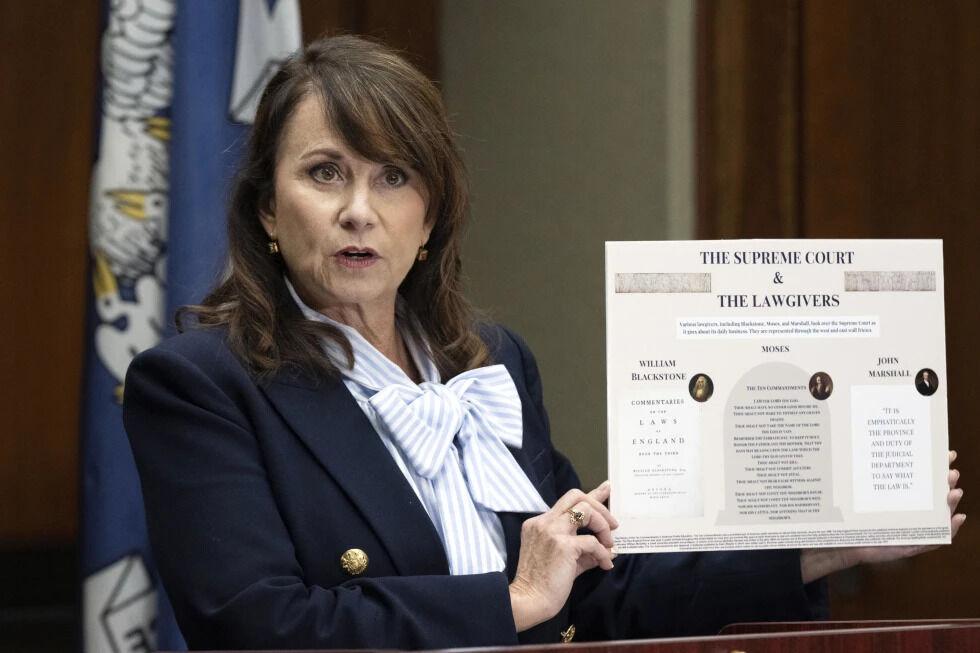Supreme Court Associate Justice Antonin Scalia invited himself to the University on Tuesday for what was meant to be an informal meeting with law students.
Scalia, who was appointed to the nation’s highest court in 1986, apparently frequents Louisiana and took this opportunity to meet with the University’s law students, said Linda Rigell, the Law Center’s director.
Law students had the opportunity to meet Scalia one-on-one at a reception prior to his address in the McKernan Law Auditorium.
“I am awestruck,” said Matt Tessier, a second-year law student. “It was like meeting the president.”
Scalia’s address drew such a large crowd that not even all the law students could fit into the auditorium. The Law Center provided two “overflow” rooms, where those who could not get in could watch the address on closed-circuit television.
Some students and faculty were upset the address did not take place in a venue that would allow more people to attend such a rare occasion. However, Rigell said Scalia requested to speak only to the law students.
“As far as I understand, it was not a formal visit for any particular reason,” she said. “It was a very nice gesture on his part.”
Scalia addressed what he called his “great cause” — constitutional interpretation.
“You would think after a couple of centuries we were in agreement [about what the Constitution says],” Scalia said. “I’m sad to tell you we aren’t.”
Scalia, a self-proclaimed originalist constitutional scholar, said citizens should take the text of the Constitution and give it the meaning it had when its framers adopted it. Although this mindset once was orthodoxy, it now is rare, he said.
Greg Richard, a second-year law student, agreed with Scalia.
“It’s the safest way to not take away the freedoms that [the Constitution] allows,” Richard said. “We should read it to understand their intent, that way we don’t go too far from their original intent.”
Rhea Smith, a third-year law student, agreed with Scalia’s textualist approach as well.
“What he said is true. You can lose certain rights if we keep adding to [the Constitution],” she said. “You can’t add things to it that were not there.”
However, not everyone shared Scalia’s sentiment.
“Sometimes the textual approach is good, but there are some times when it’s better for society for the court to intervene,” said Stephen McFadden, a second-year law student. “There are situations that come up that don’t appear in the text.”
While some believe the Constitution is a living, evolving document meant to grow as society matures and becomes more decent, Scalia condemned the idea as “idiocy.”
Scalia argued the Bill of Rights would not exist if the framers of the Constitution believed future generations would mature and do a better job at interpreting the law than they did.
“The Constitution is not a living document,” he said. “It is a legal text with a meaning which should not change whenever it is convenient for us to change it.”
Originalism has nothing to do with being a conservative, Scalia said to his critics.
“Conservatives are just as willing to bend the Constitution to their ends as liberals are,” he said.
Scalia argued if the country takes the approach of interpreting the Constitution without considering the framers’ intent, freedoms will be lost.
Scalia talked about a case that came before the Supreme Court, in which a man was accused by a six-year-old girl of sexually molesting her.
In this case, the girl was permitted to testify in an adjoining room to the courtroom with both lawyers present, while the defendant and the jury watched on closed-circuit television. The judge permitted this because the girl might be too nervous to testify in the same room with her alleged assailant. The defendant was convicted and appealed to the Supreme Court.
The Supreme Court upheld the lower court’s decision to allow the girl to testify in another room. However, Scalia dissented because he felt the move violated the defendant’s rights according to the Sixth Amendment.
The Sixth Amendment guarantees a person accused of a crime the right to a speedy and fair trial and the right to be confronted by the witness.
Scalia believed the decision took away a freedom given by the Constitution.
He said one day, people will select judges because the candidates believe what they believe, not because they uphold what the law really says.
“Unless we amend our ways, we will, in effect, hold a mini-Constitutional Convention every time we select a new federal judge,” Scalia said.
Law students flock to hear official
By Damiane Ricks - Staff Writer
November 20, 2002
More to Discover







